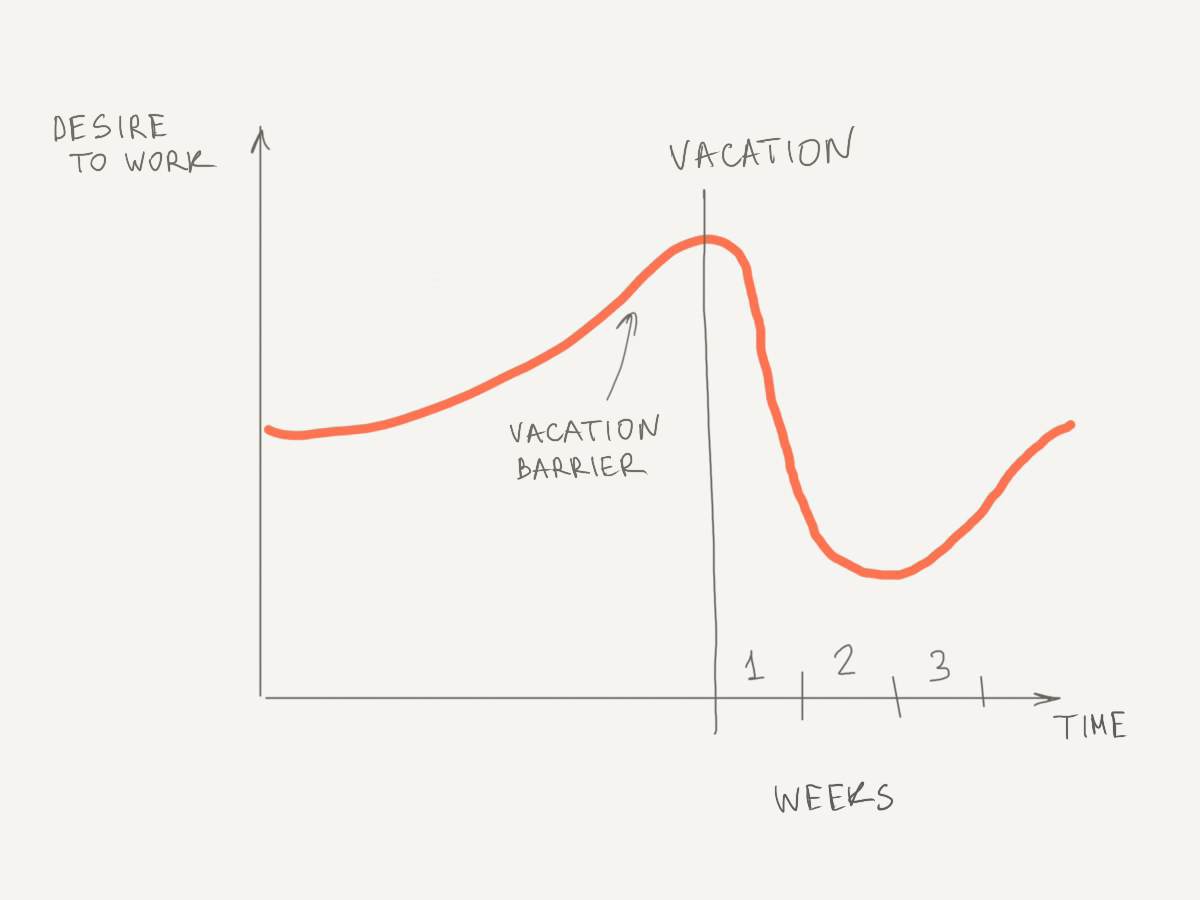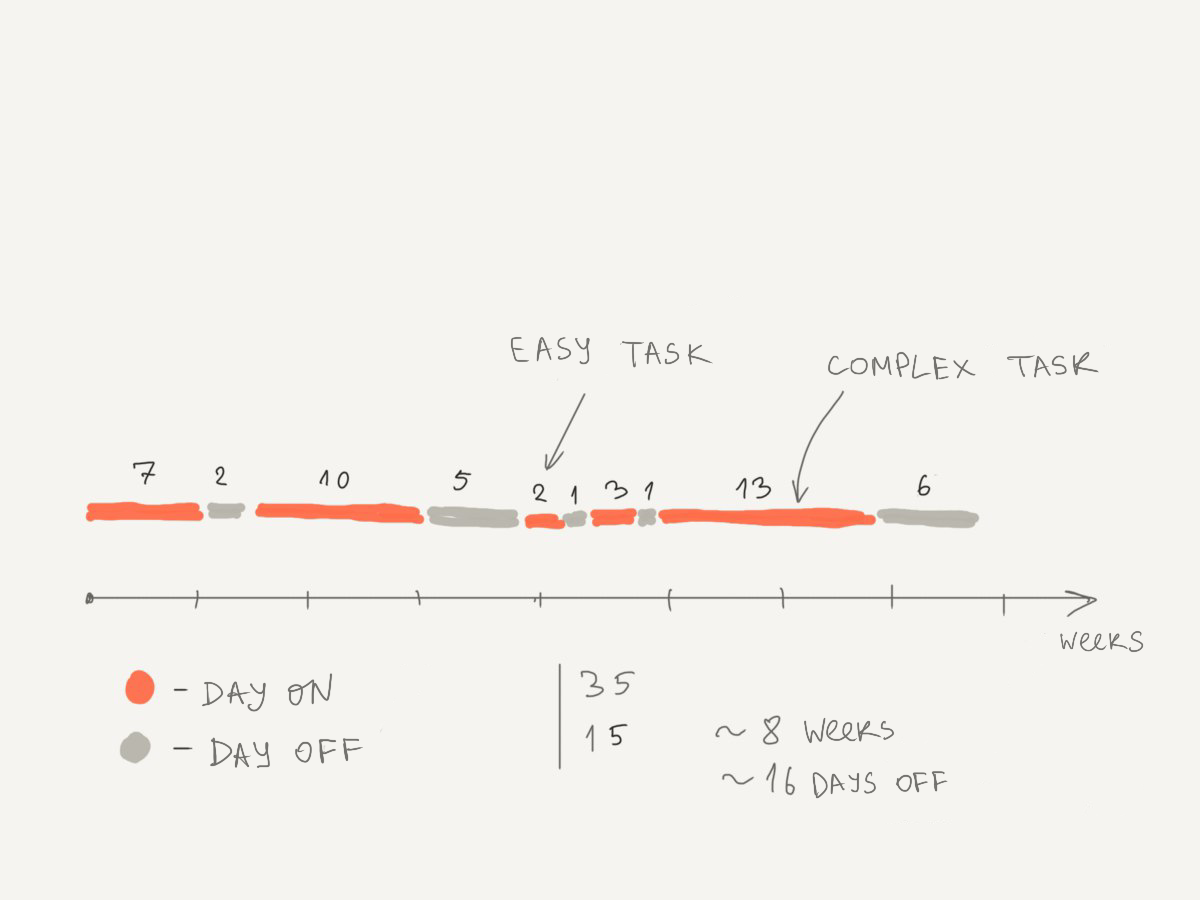Abolish Working Week
I never want to go on vacation. For real. So many exciting things are going on, all that complex, fascinating stuff at my work (no irony here!). My brain likes being a part of it. “Here’s another tricky task. Let’s go! Yippie, another puzzle to solve! Oh, a cool book recommendation, we need to read it right now!.” My brain loves to be busy. My brain is addicted to dopamine. Yours, probably, too. 🧠
So my brain hates vacations. On holiday, it needs to put up with laying on the beach, staring at the sea and tanned bodies, reading something light, sipping wine, and smearing kids with SPF. It is all extremely boring. No challenges, no complications, no possibility to tinker with intricate systems.
Contemptuously looking at a prospect of such pastime, my brain begins to come up with ingenious reasons to keep things as they are:
- Without me, everything will collapse here. People will do random shit and then quit.
- We’re at a very important stage of the project now, we need to gather feedback, and NOBODY is more capable of this than I am. I have to stay.
- Something’s wrong with my back. This might be serious. It definitely is dangerous. I need to schedule a doctor’s appointment asap. I need to cancel my tickets before it’s too late.
- Why take vacations anyway? Let the family go with my mother-in-law. I’ll stay and work in peace.
As a result, I bump against what I call the vacation barrier.

To overcome the vacation barrier, I need non-refundable plane tickets and an irrevocable apartment or hotel booking. These give me a feeling that the vacation is inevitable. I also need my significant others to force me to go: if I were to go alone, I wouldn’t, no matter how refundable my tickets were.
Funny enough, while my brain despises vacations, the rest of the body really wants to have some. For example, today, my body has made it very clear to me that there’s no longer any physical capacity for work (despite the desire). I will spare you the details, though.
That made me wonder: how can we avoid being that tired? Most likely, the core problem is in how we organize work.
Reorganizing this mess
Why do we work from Monday to Friday? What’s with the holy eight hours of work per day? Probably, this mode was tailored to the requirements of the Fordist production plants—but who said it’s optimal for software development or the creative industry?
This might sound classist, but listen: a locksmith can make a bunch of items and go home, forgetting about work (well, they might rethink an unsuccessful conversation about getting a raise, but generally, they won’t have to ponder how to solve a production problem).
Unlike a locksmith, a good programmer takes their job home. You just can’t avoid it! If there’s a difficult problem, your brain is busy solving it about 24/7. Your thoughts turn to this problem at the most unexpected moments. The problem keeps you awake, wakes you up, makes you absentmindedly add three spoons of sugar to your coffee instead of two, and makes you forget to eat. I repeat: you can’t avoid it; this is just how human consciousness works.
The point is that programmers have problems like that almost all the time. As soon as one task is finished, you get the next one. No significant pauses. Therefore, your brain enters the mode of constant problem solving, gets used to it, and never wants to leave it. The brain is waiting for a new problem as if it was a drug.
Different tasks require different amounts of time. If a problem isn’t solved on Friday, two days off won’t change shit because your brain will still be working on the solution and won’t allow you to rest.
I think we can profit from changing the way the tasks are formulated and distributed. It might be much better to work on a task without days off for some time—and NOT TAKE UP a new task immediately after. It might be better to take time off between tasks. Something like that:

The main idea is to let a developer solve the problem in one concentrated effort.
This also means the tasks should be decomposed into relatively short ones. I think the maximal length of such a task can be ten to fifteen days without days off. Shorter task? Get several days off. Longer task? Take a week off or something.
I realize that this approach can create quite some social problems: with two or more working people in a household, these schedules will be hard to synchronize. But I still would like to try it. I think it’ll be a great way to tame my own brain, prevent it from becoming a complete workaholic, and finally get rid of month-long vacations that I hate! I will keep you posted on how it goes. 🌴
Psst... Wanna try Fibery? 👀
Infinitely flexible product discovery & development platform.



